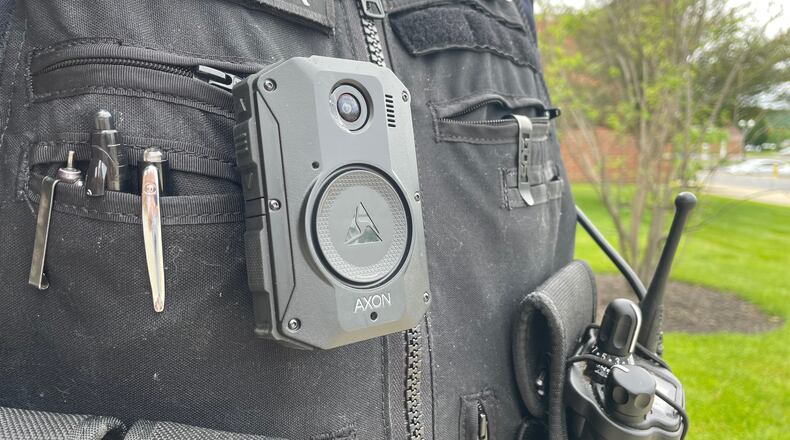Bret Crow, communications director for the Ohio Department of Public Safety, told the Journal-News they have received $11 million in funding requests and “just like the first round, priority funding will be directed to agencies starting new BWC programs and then existing programs.”
For years Butler County police departments shied away from body cameras because of the cost and the uncertainty about what needs to be retained as a record, what should or cannot be redacted and other privacy issues.
Gov. Mike DeWine encouraged all police agencies to apply for the grant funding because most of the state’s police agencies don’t have them. The state awarded $4.7 million in the first round of funding.
“Law enforcement agencies are increasingly using body-worn cameras to serve a multitude of functions, but for some agencies, the price tag is simply far too expensive,” DeWine said when announcing the second funding round. “Our goal is to help as many local agencies as possible with the costs to improve current body-worn camera technology or launch new programs.”
Jones has resisted deploying body cameras but this is the second time he has applied for the funds, again requesting $280,089 to develop a new program that will cost about $172,000 annually to maintain. Middletown is looking for $124,218 to start a program and Fairfield and West Chester townships are looking for money to augment their existing programs, $41,851 and $46,325 respectively.
Jones repeated if he doesn’t get the money he won’t implement the program.
“No I’m not excited about the cameras and if they turn me down that’s okay,” Jones said. “Hell I can hardly buy bullets and gas for my police cars and I hardly got enough money to feed my prisoners, let alone an added burden that does no good at all.”
He told the Journal-News there is already transparency on his police force but if they get the money he’ll take it, because he believes at some point in time he may be mandated to do so.
“People say this gives you transparency doesn’t it,” Jones said. “Here’s what I say no, we already have transparency, this gives me I guess triple transparency or quadruple transparency. See here, they still trust the police, they like the police in this community, this county.”
Chief Deputy Anthony Dwyer told the Journal-News the grant would pay for about 150 cameras and start-up costs for the program. Jones said he would have to hire two employees to maintain the data and handle the program.
Middletown applied for $185,161 in the first round for 78 cameras, software and one records redaction specialist. Like the sheriff, Police Chief Dave Birk at the time said he can’t implement the program without state support. He could not be reached for comment about the latest ask.
Fairfield, Fairfield Twp., Miami University, Monroe, New Miami, Oxford and West Chester Twp. have had the technology for a while. Hamilton requested $386,920 and received $81,776 in the first round of funding to start their program. In that round six police agencies applied for a total of $931,859, Oxford received $31,451 of the $34,732 they requested and Oxford Twp. received their full $10,546 request. West Chester did not get $34,410 they were seeking.
Hamilton Police Chief Craig Bucheit told the Journal-News they just received their cameras this week and hopes his officers will be wearing the new equipment within about a month. He said they are looking forward to having the new public safety tool.
“I think our officers see them as a tool and as a benefit to them to help them do their job,” Bucheit said. “It’s another tool to help them do a very difficult and challenging job and I think they’re looking forward to us getting this program up and running.”
This week the West Chester trustees approved a five-year renewal contract with Axon Enterprise, Inc. —the company outfitting most if not all of the police agencies here — totaling $231,841. Police Chief Joel Herzog said the contract is all inclusive and they get all new hardware with the package.
He said they studied the program for a couple years before implementing it because “this is an expensive product and this is new technology, we don’t want to just jump in and get something that we’re unhappy with.”
When the township deployed the program they had to feel their way in developing a policy that didn’t violate privacy rights and complied with public records laws. A new law took effect in 2019 that gave guidance for using the cameras, it identified 17 instances in which video recorded by body cameras are exempt from disclosure. Among them are:
• Inside a residence unless the incident involves “an adversarial encounter with, or a use of force by, a peace officer”
• Showing children
• A death or dead body unless, it was caused by a peace officer
• A nude body, unless the person consents
• “Grievous” bodily harm to a peace officer, firefighter, paramedic or other first responder
Herzog said that guidance has helped with the expense of storing video. He said there was a learning curve in the beginning because officers weren’t accustomed to switching the cameras on but now its second nature.
Trustee Mark Welch said “I think it’s one of the best things we’ve done.”
“I mean just transparency and all that and I think it actually gives people a sense of security,” Welch said. “Knowing that you have a camera on you and if I’m being pulled over or arrested or something like that, when people know that they’re being watched they want to behave better.”
Herzog agreed and said it impacts the officer’s behavior as well, “the officers they’re aware of it so it’s raising us to the next level also, I can’t say enough good about this.”
About the Author

